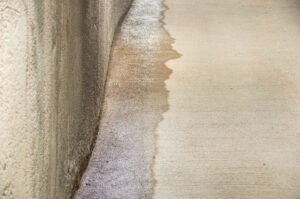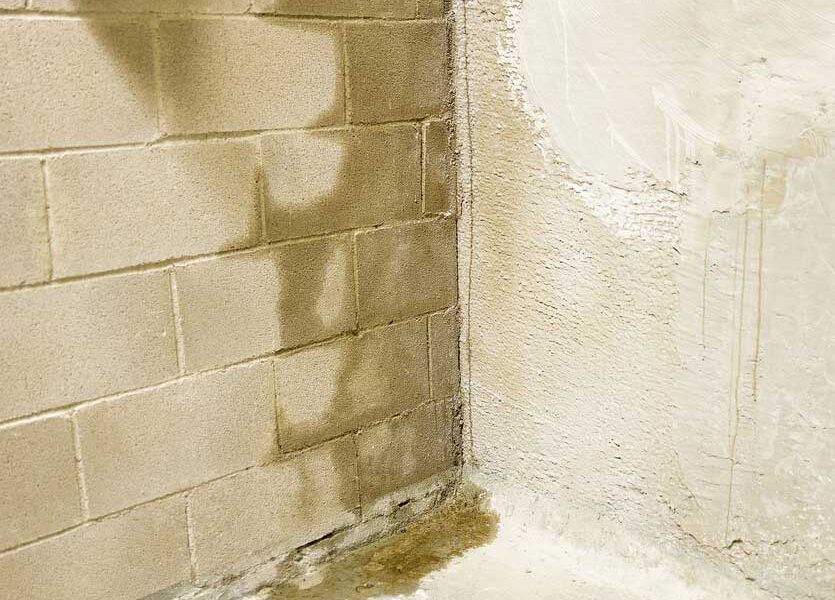Why is water seeping through my basement floor?
- May 10, 2023
- No Comments
As experts in waterproofing solutions, Value Dry Waterproofing understands how concerning and frustrating it can be to discover water infiltration in your basement. But when water appears to be coming up through the floor, what could be the cause?
Water on a basement floor could be caused by several common factors, like a broken pipe, leaking appliances, clogged or backed-up drains, clogged gutters, poor drainage, and poor grading. However, when subsurface water seeps up through cracks in a concrete floor or through foundation walls, it is due to hydrostatic pressure.
Hydrostatic pressure is created when excess moisture gets into the soil surrounding your foundation and doesn’t have anywhere to go, creating water pressure under the concrete floor and against the basement walls. If the water shows up during or shortly after heavy periods of precipitation chances are it is caused by hydrostatic pressure.
Let’s look at some of the causes behind this common issue for homeowners in the Mid-Atlantic region.
What are the sources of basement leaks?
Blocked drains or cracked pipes are the most common source of basement flooding. Pipe insulation is important for preventing bursts, but performing regular inspections can catch cracks, leaks, and blockages before they get worse.
Besides this, other culprits of basement leaks include:
- Cracks in the foundation: Concrete floors and walls are poured at two different times, creating a seam for water to seep in. In addition, concrete is porous, so capillary action absorbs underground water. In addition, hydrostatic pressure from groundwater outside your basement compromises the integrity of your basement walls.

- Leaking windows: An improperly caulked or sealed window can be the source of your leakage. After heavy rain, inspect your windows for leaks. If they aren’t sealed properly, replace the caulk immediately.
- Undrained or deteriorating window wells: If window wells are rotten, detached, or not high or large enough to prevent water from spilling into your window well, it will fill up like a fishbowl and leak. Window wells should have a functioning drain in the bottom to help prevent this, but you must maintain it!
- Groundwater around your foundation: Water seeping into the basement through porous concrete can be caused by groundwater infiltrating the foundation. To prevent this, ensure the ground surrounding the foundation is not sloping towards the house, creating a “moat” effect that allows water to leak into the foundation walls and basement. Sloping the ground away from the foundation is a recommended preventative measure to avoid a leaking basement, as it helps to divert water away from the house.
- Faulty drainage systems: Improperly installed drainage systems can lead to leaks. If your downspouts are less than 6 feet from your basement wall or the drains are directed towards the foundation, they could be the culprit – consider readjusting them.
What’s the difference between water seepage and water leakage into a basement?
Water seepage occurs when water moves through porous materials such as concrete, brick, or stone. Whereas water leakage occurs when water flows through an opening like a window, doorway, or crack in the foundation wall or floors.
Signs of water seepage in your basement floor include:
- Standing water or puddles: This is one of the most obvious signs of seepage in your basement. It could be a leak from your washing machine, a bad pipe, water heater, sink, or shower.
- Damp and musty smells: While basements are generally damp and musty, it could be a sign of water seepage if it’s overly so.
- Mildew and mold: Basements are great breeding grounds for mold and mildew. Mold and mildew thrive in the presence of organic materials and high humidity. You’ll notice mold stains on furniture, carpeting, cardboard boxes, and drywall.
- Efflorescence: This white, powdery substance appears on basement walls and floors when water evaporates, leaving behind mineral deposits.
- Warped or buckling flooring: Water seepage can cause the flooring to become warped or buckle, indicating long-term water damage.
- Rust stains: Water seepage can cause rust stains on metal objects such as pipes, appliances, and under furniture legs.
How can I prevent water coming up through the basement floor?
Water seepage into your basement floor can cause major damage. Fortunately, there are several preventative maintenance measures you can take to avoid it:
- Improve outside drainage: Ensure the ground around your home slopes away from the foundation to divert water from your basement. You can install gutters and downspouts to direct rainwater away from the house.
- Install or replace sump pump: A sump pump helps prevent water seepage by pumping out excess water accumulating in the sump pit. If you already have a sump pump, regularly maintain and test it to ensure it functions properly. If you do not have a sump pump in place, consider sump pump installation.
- Add interior drainage: Install a perimeter drain system or French drain to help collect and redirect water seeping into the basement. This helps alleviate pressure on the basement floor and walls.
- Protect against plumbing leaks: Regularly inspect and maintain your plumbing system to prevent leaks or bursts. You can install a backwater valve to prevent sewage backup from entering your home.
- Install new windows and window well covers: If your basement windows are old or damaged, replace them with new, energy-efficient ones with proper seals. You can also install window well covers to prevent water and debris from accumulating in the window well.
- Repair foundation cracks: Cracks in your foundation allow water to seep through and into your basement. Hire a professional to inspect and repair any cracks to prevent water infiltration.
- Check the roof for damage: Damaged and clogged roofs cause water to seep into your home and basement. Regularly inspect and maintain your roof to prevent water damage.
What happens if I ignore a basement leak?
Water seepage in your basement can lead to mold, mildew, wood rot, and general water damage. The longer you ignore the problem, the worse the situation gets, requiring a more costly repair.
Other results of water damage include:
- Carpet discoloration: It might not be a big deal if only a little water has seeped through your basement and found a home under the carpet or concrete. However, the stains it leaves can be costly to clean off your carpet.
- Tarnished walls: Spot leaks or floods leave unsightly stains on the walls. On the one hand, the stains help you pick up on a basement seepage problem, but on the other, it translates into costly repairs consisting of fresh paint or new drywall.

- Mold – If you leave moisture in your carpet or walls, mold will grow, leading to respiratory problems. The best approach to prevent mold and mildew growth is drying your basement immediately. You can dispose of an item that isn’t on its way to being dry in the first 24 hours.
- Wide foundation cracks: Cracks on the basement floor could have been the cause of your water seepage. But if you let the seepage continue, water will flow through the small crack and widen it, worsening the situation.
- Collapse – If you ignore water seepage for long, your foundation will weaken and might buckle, causing the foundation to collapse. Although this is an extreme case, it’s a possibility.
Call Value Dry for your basement waterproofing needs
If you are experiencing basement leakage, it is essential to address the problem promptly to avoid potential risks such as structural damage, mold and mildew, and health issues. At Value Dry Waterproofing, we are committed to providing high-quality basement waterproofing services to help protect your home and your family.
Our team of experienced professionals uses the latest techniques and equipment to assess your situation and recommend the best solution. We offer basement waterproofing services, including foundation repair, interior and exterior drainage systems, and sump pump installation.
Contact us today to schedule a consultation and learn more about our basement waterproofing services. We are committed to helping you protect your home and your family from the potential risks of basement leakage.


